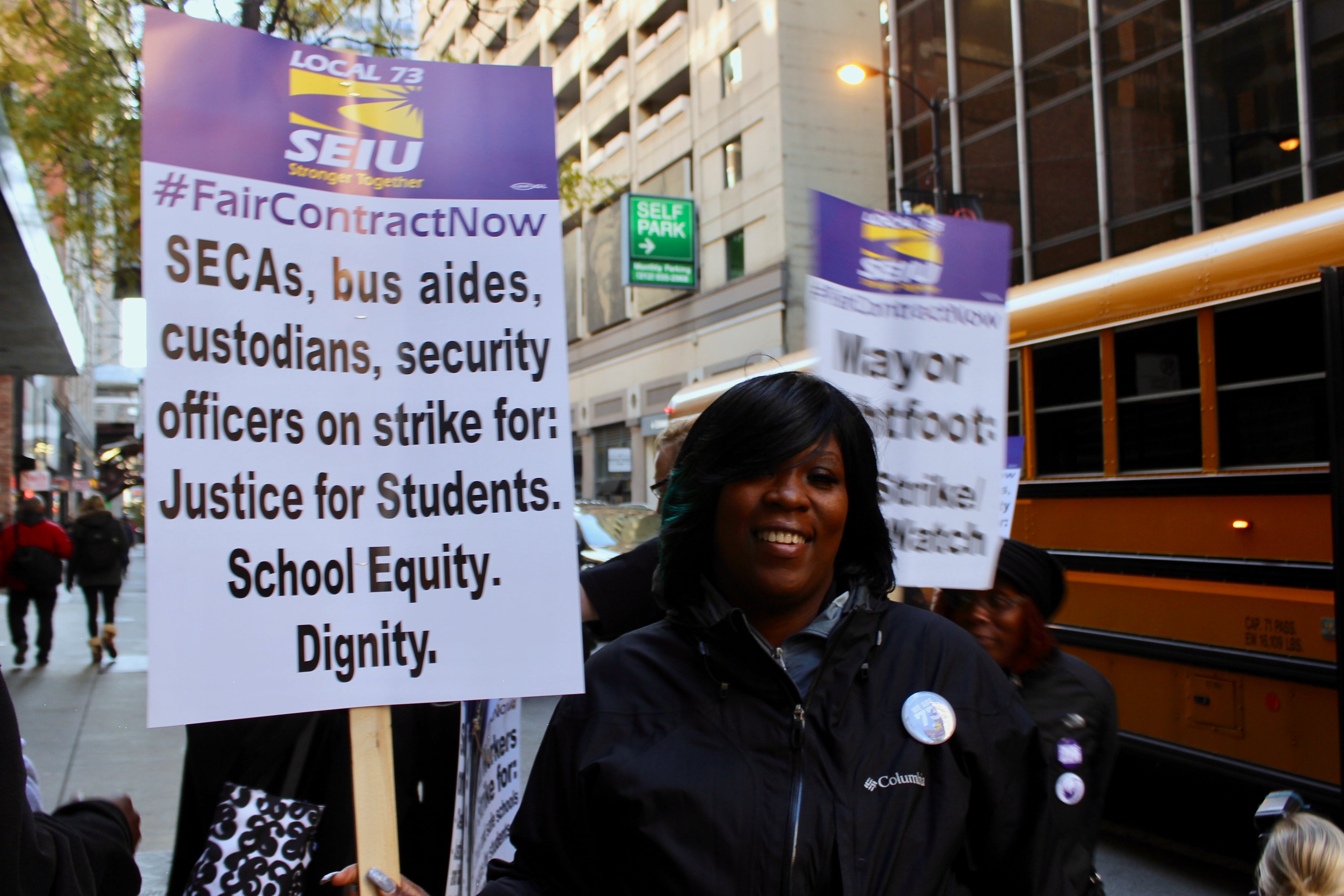Sign up for Chalkbeat Chicago’s free daily newsletter to keep up with the latest news on Chicago Public Schools.
The Chicago Teachers Union’s contentious contract negotiations have already spurred a major clash between district leaders and Mayor Brandon Johnson’s office and endangered CEO Pedro Martinez’ role.
Now the teachers union’s demands for a significant expansion of CTU-represented positions and of educators’ say over school matters are pitting that union against two other district labor groups: The Chicago Principals and Administrators Association and the Service Employees International Union 73, a longtime CTU ally.
The principals union, which is in the midst of negotiating its first contract with CPS, wrote a letter this week to the Board of Education saying some CTU proposals would trample on principals’ authority to run schools. Meanwhile, the Service Employees International Union 73, which represents support staff at schools, has voiced concern over a CTU demand it says will take work away from its members — and threatened to sue the district if it approves the proposal, the Chicago Tribune reported. The rift with the SEIU is especially notable as that union has jointly advocated for more special education services and staff with the teachers union, and the two groups went on strike together in 2019.
Principals union leaders said they are concerned about school board pressure on Martinez to settle the teachers contract as quickly as possible and about the cost of the union’s staffing and other proposals. They worry that the cash-strapped district might have to resort to assistant principal layoffs and other cuts to afford them. CPS estimated the union’s initial proposals to cost $10 billion but is reassessing that estimate; the union has called that estimate inaccurate and has pared back some of its proposals, but it has not shared a cost estimate.
“We don’t believe the problematic provisions are intentionally problematic,” wrote Troy LaRaviere, CPAA’s president, in the letter to the board. “They are simply the result of the limited perspective of teachers. By that I mean teachers run classrooms, not schools.”
Thad Goodchild, CTU deputy general counsel, told Chalkbeat that the goal of the union’s proposals is to beef up staffing in critical areas and ensure teachers have a voice at schools. He said there’s “an open dialogue” between leaders of both unions, and CTU is also “working to find a solution” with SEIU.
Contract negotiations with the teachers union have stretched on since April and soured the relationship between Martinez and Mayor Brandon Johnson, a former teacher, CTU employee and close union ally, who has asked Martinez to resign. The school board, installed by Johnson after the previous board resigned amid the conflict, wrote to Martinez late last month to demand a quick resolution to the talks.
The CTU recently shared what it is calling a “roadmap to settlement” with the district, including a smaller raise proposal than the 9% a year it demanded at first and a pared-down set of staffing and other demands. But that roadmap still includes proposals that would give teachers the final say over curriculums and a larger role in evaluating principals.
Principals worry their role in school decisions will shrink
The principals union says one of its major concerns is a proposal that would allow teachers to pick their own curriculums as long as they meet state learning objectives.
Goodchild, from CTU, said the proposal is meant to ensure that teacher voice exists in all schools.
“Academic freedom doesn’t mean that teachers get to teach whatever they want — it means that their professional judgment is respected and that they aren’t expected to teach from scripted, online curriculum with lots of gaps in it, which unfortunately is the direction that district has been heading in recent years,” Goodchild said.
But one elementary school principal, who spoke with Chalkbeat on condition of anonymity in order to speak candidly, said she felt that allowing teachers more academic freedom would prevent staff from developing a schoolwide strategy for instruction.
“I know it’s not implemented really well in every single school, but the mechanism for that teacher input and voice exists, and I think to swing to the extreme of every teacher making their own decision in that regard is going to be harmful for kids,” the principal said.
The principals union, which formed last year, also started negotiating with the district in April. But unlike the publicly contentious teachers' contract negotiations, talks with principals have unfolded quietly behind closed doors, and the two sides have taken a few months off as the CTU talks intensified.
According to a CPS presentation for the school board obtained by Chalkbeat, district officials and principals union leaders have met five times, and the union has put forth proposals on wages and benefits, discipline and discharge procedures for school leaders, and more.
The two sides haven’t reached agreements yet, Banks said, but, “We have enjoyed a much more amenable and open-minded engagement with CPS than others have.”
Earlier this week, a group of school leaders working independently of the union also sent a letter to the school board saying the contract talks with the CTU and the pressure on Martinez to step down are creating “an atmosphere of uncertainty.” Nearly 700 CPS principals and assistant principals representing almost 80% of the district’s campuses signed the letter, arguing that replacing the CEO would be “a decision rooted in political interests, not the interest of students.”
CTU leaders have dismissed these concerns on social media, with Vice President Jackson Potter recently calling principals “middle management foremen of the system.”
SEIU says CTU demands will hurt its members
Other CTU proposals have threatened a rift with SEIU Local 73.
A recently amended contract proposal by the Chicago Teachers Union obtained by Chalkbeat Chicago would give the district more flexibility to choose between teacher assistants, represented by the CTU, or Special Education Classroom Assistants (or SECAs), represented by SEIU, based on what a student’s Individualized Education Program or a 504 plan requires. SEIU Local 73 says this proposal will take work away from SECAs, who are trained to work with students with disabilities.
Stacia Scott, executive vice president of SEIU Local 73, told Chalkbeat that adding flexibility for school leaders to choose between teacher assistants or SECAs to work with students with disabilities could cause confusion in a school building.
“We have tried to make our contract as explicit as possible so that we can focus on ensuring that SECAs are providing the services that are legally required to special education students,” Scott said.
SEIU Local 73’s recent contract with the district requires that SECAs receive professional development and training and that SECAs are included in IEP meetings. It also protects SECAs from performing other tasks in schools that would take time away from students with disabilities, unless it is to support a student’s IEP.
Goodchild said the CTU proposal is ultimately meant to beef up special education staff such as teacher assistants so that students with IEPs get the support they need.
The number of SECAs has grown by roughly 150% over the past decade, when comparing employee figures from December 1, 2014 to the same day this month, according to data from CPS. In that same time period, the total number of teacher assistants grew by just over 50%, the data show.
“We’re trying to, you know, restore balance,” Goodchild said.
Mila Koumpilova is Chalkbeat Chicago’s senior reporter covering Chicago Public Schools. Contact Mila at mkoumpilova@chalkbeat.org.
Samantha Smylie is the state education reporter for Chalkbeat Chicago covering school districts across the state, legislation, special education and the state board of education. Contact Samantha at ssmylie@chalkbeat.org.
Reema Amin is a reporter covering Chicago Public Schools. Contact Reema at ramin@chalkbeat.org.





